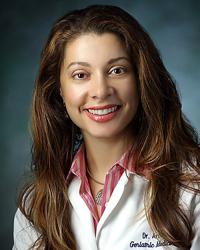Takeaway
Mid-life is a period marked by multifaceted challenges, including physical, emotional, and social stressors. By adopting a holistic approach that addresses the whole patient healthcare professionals can provide more comprehensive and effective care.

Lifelong learning in clinical excellence | December 4, 2024 | 2 min read
By Alicia Arbaje, MD, MPH, PhD, Johns Hopkins Medicine
Middle age: what is it exactly? Though the age ranges vary (somewhere between 40 and 60 years), I feel squarely in it. In fact, what makes me (and I suspect others) feel “middle-aged” is less about age and more about the experiences that often come with this time in life. Juggling caregiving responsibilities to oneself, aging parents, extended family, children. Facing one’s own, or others’, health issues, illnesses, and mortality. A drive to align one’s personal and professional goals with one’s values in a more meaningful way. Changing and evolving family, friend, or relationship dynamics. Developing the awareness and skills to integrate our childhood experiences. Progression along a spectrum from knowledge to wisdom (I’m really hoping this progression is speedy!).
For historically minoritized groups, those with limited resources, or those with early traumatic experiences, “middle age” may come much earlier than actual middle age. In some ways, the pandemic accelerated many of the issues often seen in middle age—thrusting many of us into a state of questioning and realignment.
“Middle age” is a significant transition in life, and one that isn’t talked about outside of stereotypical, and often ageist, frameworks. As physicians, it’s important that we honor and recognize all of life’s transitions within ourselves and within our patients.
How can we do this? We can ask for wisdom, life lessons, and advice from others. We can ask our patients to describe how they are moving through this life transition, or how they made it through. We can check in with our patients’ adult children and ask about patterns we’re observing, such as stress, weight gain, aches/pains, and most of all—overwhelm.
Reflection, resilience, and resolve
Just as we encourage medical students and other learners to reflect on their experiences, physicians can encourage reflective practice to get to know oneself and what one’s thinking and feeling and to go back to it and see what kind of growth has occurred. Being in the middle is a great time to look both backwards and forwards.
In terms of resilience, as life’s curveballs hit, we can think about how to reframe and recover from different types of experiences. We can encourage ourselves and our patients that “middle age” can be a time of resilience and growth. Life’s challenges can teach us to be more compassionate and kind physicians when seeing our patients going through their journeys. It can allow us to give ourselves and our patients a bit of grace through the process.
We can help our patients to resolve to make important changes in their lives as a result. The health we have in middle age directly predicts the health we have in older age, so it is important to take care of things early. If they don’t have one already, we can help them find a longitudinal healthcare provider to help navigate life’s transitions. Maybe we can be that person for them.
Listen to the author speak on these topics on NPR’s “1A.”
This piece expresses the views solely of the author. It does not necessarily represent the views of any organization, including Johns Hopkins Medicine.

